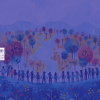
Co-organized by IIASA, the United Nations Development Programme (UNDP), and the Austrian Academy of Sciences, this hybrid event marks the Austrian launch of the Human Development Report 2023-2024 "Breaking the gridlock: Reimagining cooperation in a polarized world" with a keynote presentation by Pedro Conceicao, Director of the UNDP Human Development Report Office, followed by flash talks and a panel discussion focusing on human agency as a foundation for sustainable development.
We live in a highly interdependent world. Despite a slowdown in economic globalization, complex global interdependencies are deepening, supercharged by digital technologies and humans’ pressures on our planet, giving rise to new planetary-level challenges. Warming temperatures, viruses, or digitally spread misinformation, do not stop at national borders. Yet today, collective action on challenges ranging from climate change mitigation to peace and security, is frustratingly slow. Lack of trust and polarization within and across societies, associated with perceptions of insecurity and heightened feelings of distress, exacerbates the gridlock.
Why is humankind failing to collaborate and contain a growing number of social, economic, ecological, and technological challenges? The 2023-2024 Human Development Report (HDR) warns that our collective failure to leverage human potential and collective action to mitigate climate change and achieve the Sustainable Development Goals is due to an ‘agency gap’—the disparity between perceived and actual possibilities. According to the HDR, human agency, that is “people’s ability to determine for themselves what it means to live a good life, including defining and reassessing their responsibilities to other people and the planet”, has depleted in many ways. Reimagining cooperation and achieving collective action to address global challenges hinges on closing these agency gaps, that is enabling people to feel more secure and more in control over their lives and our collective future.
With the 2023-2024 as a guiding point, this event will discuss what reimagining cooperation in a polarizing world looks like, and how expanding human agency may help. Building on last year’s successful event held on 22 February 2023 at the Austrian Academy of Sciences, Human Development, Sustainability and Agency, this year’s Austrian HDR 2023-2024 launch event will feature experts exploring the notion of sustainable agency, that involves intentionally and positively influencing the wellbeing of others, including future generations and non-human life forms, beyond self-centric desires.
PROGRAM
Event Moderator: Elena Rovenskaya, Advancing Systems Analysis Program Director, IIASA
9:30 (CEST) Registration and welcome tea/coffee
10:00-10:15 Opening remarks
- Peter Huber, Director General for Development, Federal Ministry for European and International Affairs of the Republic of Austria
- Karen Lips, Deputy Director General, IIASA
- Christian Koeberl, Professor, University of Vienna & IIASA Council member for Austria
10:15-10:50 Keynote presentation followed by Q&A
- Pedro Conceicao, Director, Human Development Report Office, UNDP
10:50-11:05 Flash talks
- Monika Froehler, CEO, Ban Ki-moon Center for Global Citizens
- Gloria Benedikt, Research Artist and Stage Director
- Pratik Patil, Researcher, IIASA
11:05-11:55 Panel discussion
- Robert Boehm, Professor, University of Vienna
- Nina Klimburg-Witjes, Professor, University of Vienna
- Lukas Wank, Director, Global Responsibility
- Caroline Zimm, Research Scholar, Population and Just Societies Program & Energy, Climate, and Environment Program, IIASA
11:55-12:00 Closing remarks
12:00-12:45 Networking reception
United Nations Development Program (UNDP) assists countries in identifying their ways to address development challenges and helps them strengthen their national and local capacities to accelerate progress to human development and the SDGs. Since 1990, Human Development Reports have been released exploring different themes pertinent to human development, which has had extensive influence on development debate worldwide.
For over 50 years, the International Institute for Applied Systems Analysis (IIASA) has been addressing itself to the global challenges arising from technological development through a systems approach. Identifying policy options to reduce human footprints, enhance the resilience of natural and socioeconomic systems, and help achieve the Sustainable Development Goals is the core objective of the Institute within its decadal strategy 2021-2030. IIASA has 20 national and regional member organizations. In the host country Austria, this is the Austrian Academy of Sciences (OeAW).
Upcoming Events
Austrian Academy of Sciences, Dr. Ignaz-Seipel-Platz 2, 1010 Vienna
IIASA-OeAW lecture: research and prevention of forest fires
Vienna, Austria and online




